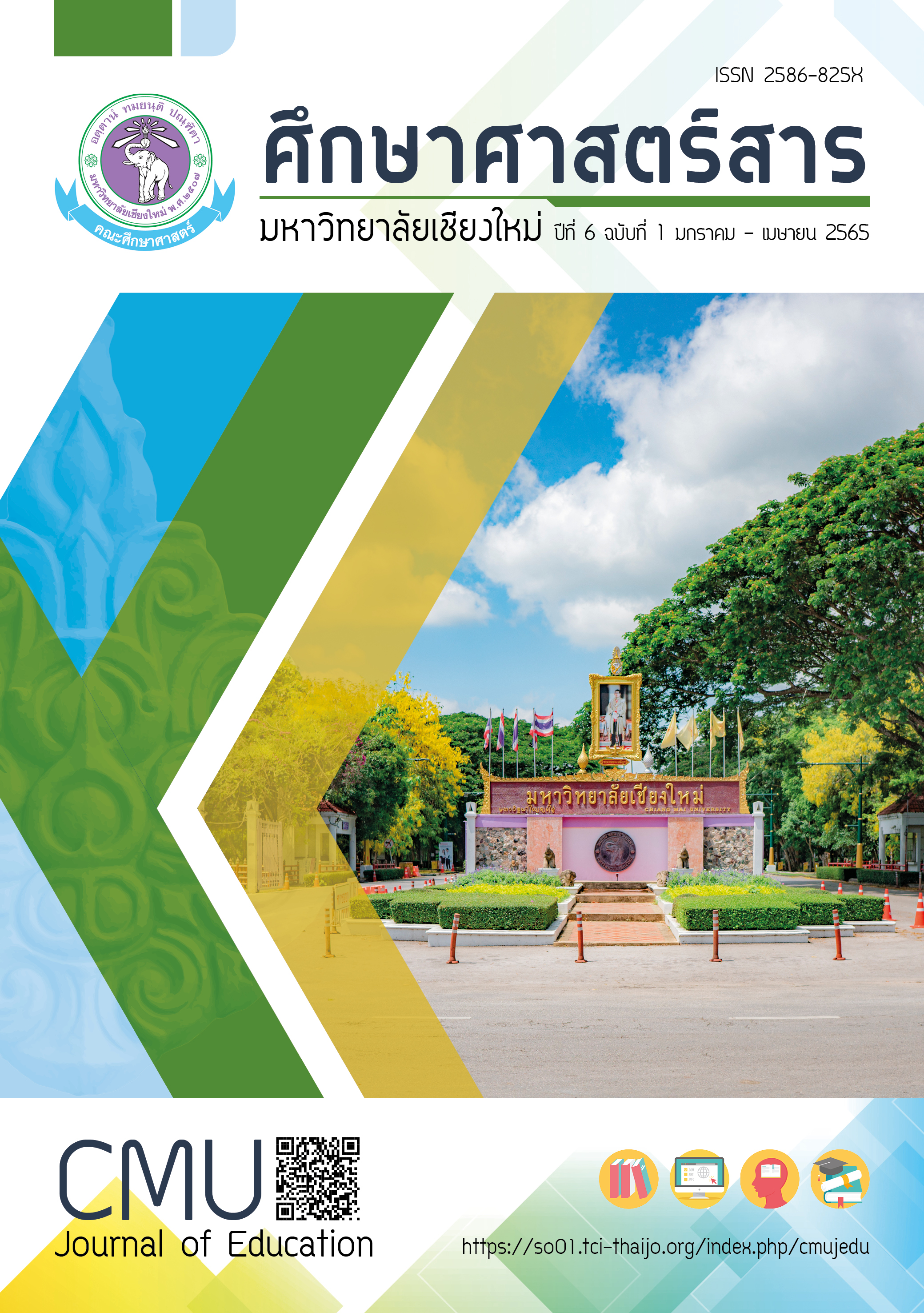Upper Secondary Students’ Metacognitive Thinking Skills in Chemistry Problem Solving
Main Article Content
Abstract
This qualitative research aimed to study an ethnic group of 20 higher secondary students’ metacognitive thinking skills in solving chemistry problems by asking them to complete a metacognitive test, which comprised of six items regarding to two domains (i.e., chemistry knowledge and problem solving process) in combination with individual semi-structured interviews. By comparing the scores on the test, the students were divided into four groups (i.e. those with metacognitive thinking skills could be divided into three levels excellent, good, and fair 8.33%, 35.85% and 44.17% respectively and those without metacognitive thinking skills 11.67%). Based on this result, it was noticeable that students’ fluency using Thai language influenced on their metacognitive thinking skills.
Article Details

This work is licensed under a Creative Commons Attribution-NonCommercial-NoDerivatives 4.0 International License.
หากผู้เสนอบทความมีความจำเป็นเร่งด่วนในการตีพิมพ์โปรดส่งลงตีพิมพ์ในวารสารฉบับอื่นแทน โดยกองบรรณาธิการจะไม่รับบทความหากผู้เสนอบทความไม่ปฏิบัติตามเงื่อนไขและขั้นตอนที่กำหนดอย่างเคร่งครัด ข้อมูลของเนื้อหาในบทความถือเป็นลิขสิทธิ์ของ Journal of Inclusive and Innovative Education คณะศึกษาศาสตร์ มหาวิทยาลัยเชียงใหม่
References
กาญจนา สามเตี้ย. (2551). การพัฒนารูปแบบการสอน PRIPARE เพื่อพัฒนาความสามารถเมตาคอกนิชันของเด็กปฐมวัย
(วิทยานิพนธ์การศึกษาดุษฎีบัณฑิต). สาขาวิชาการศึกษาปฐมวัย บัณฑิตวิทยาลัย มหาวิทยาลัยศรีนครินทรวิโรฒ.
กระทรวงศึกษาธิการ. (2551). ตัวชี้วัดและสาระการเรียนรู้แกนกลางกล่มุสาระการเรียนรู้ วิทยาศาสตร์ ตามหลักสูตร
แกนกลางการศึกษาขั้นพื้นฐาน พุทธศักราช 2551. กรุงเทพฯ: โรงพิมพ์ชุมนุมสหกรณ์การเกษตรแห่งประเทศไทย.
ธรรมนัด โถบำรุง. (2551). การศึกษาความตระหนักคิดในระหว่างการแก้ปัญหาทางคณิตศาสตร์จากการเขียนอธิบายของ นักเรียน. วารสารศึกษาศาสตร์มหาวิทยาลัยขอนแก่น, 8(1), 117-124.
ธูปทอง กว้างสวาสดิ์. (2554). การสอนการคิด. กรุงเทพฯ: ข้าวฟ่าง.
นัตพงษ์ อนงค์เวช. (2561). ผลการใช้วัฏจักรการสืบเสาะหาความรู้ 5 ขั้นตอนร่วมกับประสบการณ์ทางอภิปัญญาในรายวิชา ปฏิบัติการพันธุศาสตร์สำหรับนักศึกษาระดับปริญญาตรี. วารสารสาขามนุษยศาสตร์ สังคมศาสตร์ และศิลปะ ฉบับ ภาษาไทย มหาวิทยาลัยศิลปากร, 11(3), 1436-1453.
พัทธ ทองต้น. (2545). ผลของการเรียนวิทยาศาสตร์โดยใช้กลวิธีเมตาคอกนิชันต่อความสามารถในการแก้โจทย์ปัญหา วิทยาศาสตร์ และต่อการพัฒนาเมตาคอกนิชันของนักเรียนมัธยมศึกษาตอนต้น(วิทยานิพนธ์ปริญญาครุศาสตร มหาบัณฑิต). ภาควิชามัธยมศึกษา สาขาการศึกษาวิทยาศาสตร์ คณะครุศาสตร์ จุฬาลงกรณ์มหาวิทยาลัย.
พาสนา จุลรัตน์. (2558). เมตาคอกนิชันกับการเรียนรู้. วารสารวิชาการศึกษาศาสตร์, 14(1), 1-17.
พงษ์พันธุ์ ศรีมันตะ. (2559). การพัฒนากิจกรรมการเรียนรู้คณิตศาสตร์ตามแนวคิดทฤษฎีคอนสตรัคติวิสต์ที่เน้นการคิดเชิง อภิปัญญา เรื่อง ความน่าจะเป็น ชั้นมัธยมศึกษาปีที่ 6. วารสารวิจัย มข. มส. (บศ.), 4(3), 132-136.
ประภัสสร เพชรสุ่ม. (2560). ผลการจัดกิจกรรมการเรียนรู้โดยใช้วิธีการแบบเปิดที่มีต่อความสามารถในการแก้ปัญหาทางคณิตศาสตร์ของนักเรียนชั้นมัธยมศึกษาปีที่ 2. วารสารราชพฤกษ์, 15(1), 80-87.
ประสิทธิ์ ลีปรีชา. (2557). กระบวนทัศน์การศึกษาชาติพันธุ์สัมพันธ์. วารสารสังคมลุ่มนํ้าโขง, 10(3), 219-242.
ลือชา ลดาชาติ. (2558). การวิจัยเชิงคุณภาพสำหรับครูวิทยาศาสตร์. กรุงเทพมหานคร: สำนักพิมพ์แห่งจุฬาลงกรณ์ มหาวิทยาลัย.
วรัทยา มณีรัตน์. (2560). การพัฒนาทักษะกระบวนการแก้โจทย์ปัญหาเคมีเรื่อง กรด เบส โดยใช้กระบวนการแก้ปัญหาของ
โพลยาสำหรับนักเรียนชั้นมัธยมศึกษาปีที่ 5. วารสารหน่วยวิจัยวิทยาศาสตร์ เทคโนโลยี และสิ่งแวดล้อมเพื่อการเรียนรู้, 8(2), 297-306.
ศรชัย มุ่งไธสง. (2560). สภาพและปัญหาการจัดการเรียนการสอนภาษาไทยของนักเรียนบนพื้นที่สูง กลุ่มโรงเรียน สังกัด
สำนักงานเขตพื้นที่การศึกษาประถมศึกษาเชียงราย เขต 3 จังหวัดเชียงราย. วารสารสังคมศาสตร์วิชาการ มหาวิทยาลัยราชภัฏเชียงราย, 10, 9-22.
สิริเกศ หมัดเจริญ และ น้อยทิพย์ ลิ้มยิ่งเจริญ. (2554). การพัฒนาความสามารถในการแก้ปัญหาและ ผลสัมฤทธิ์ทางการเรียน
วิชาฟิสิกส์ เรื่องเสียง ของนักเรียนชั้นมัธยมศึกษาปีที่ 5 โดยใช้กลวิธีเมตาคอกนิชัน. วารสารศึกษาศาสตร์ ฉบับวิจัยบัณฑิตศึกษา มหาวิทยาลัยขอนแก่น, 5(4), 94 – 101.
อังคาร์ เทพรัตนนันท์. (2557). ผลการจัดกิจกรรมการเรียนรู้แบบร่วมมือโดยเสริมการคิดอภิปัญญาที่มีต่อผลสัมฤทธิ์ทางการ เรียน เรื่อง ปริมาณสารสัมพันธ์ และความสามารถในการคิดอภิปัญญา ของนักเรียนมัธยมศึกษาปีที่ 4 โรงเรียน สวนศรีวิทยา จังหวัดชุมพร. วารสารวิชาการมหาวิทยาลัยราชภัฏสงขลา, 7(2), 31-43.
อัมพร เบญจพลพิทักษ์. (2559). ภาษา การสื่อสาร และการประยุกต์ใช้ในชีวิตประจำวัน. นนทบุรี: สำนักพิมพ์มหาวิทยาลัยสุโขทัยธรรมาธิราช.
Adegoke, O.S. (1990). Waste Management within the Context of Sustainable Development. Department of Geology: Obafemi A wolowo University.
Annemie Desoete. (2016). Metacognitive macroevaluations in mathematical problem solving. Learning and Instruction, 16, 12-25.
Annemie Desoete, Herbert Roeyers, and Ann Buysse. (2001). Metacognition and Mathematical Problem Solving in Grade 3. Journal of Learning Disabilities, 34, 435-449.
Catherine M. Aurah, Setlhomo Koloi-Keaikitse, Calvin Isaacs, Holmes Finch. (2011). The role of metacognition in everyday problem solving among primary students in Kenya. Problems of
education in the 21st century, 30, 9-21.
Costa,L.A.; & Kallick,B. (2000). Describing 16 habits of mind. Retrieved form
http://www.habitsofmind.net/pdf/16HOM2.pdf.
Dahsah.(2007).Teaching and learning using conceptual change to promote Grade 10 students’
understanding and numerical problem solving skills in stoichiometry. Ph.D. (Science Education) thesis, Kasetsart University Bangkok, Thailand.
Dahsah, C. & Coll, R.V. (2007). Thai Grade 10 and 11 students’ conceptual understanding and
problem – solving ability in stoichiometry. Research in Science and Technological Education, 25(2), 227-241.
Flavell, J.H. (1979). Metacognition and Cognitive Monitoring : A new Area of Cognitive Developmental Inquiry. American Psychologist, 34(10), 906-911.
Julie Dangremond Stanton, Xyanthe N. Neider, Isaura J. Gallegos, and Nicole C. Clark. (2015).
Differences in Metacognitive Regulation in Introductory Biology Students: When Prompts Are Not Enough. CBE—Life Sciences Education, 14, 1-12.
Lester, FK. (1994). Musing about mathematical problem-solving research: 1970-1994.
Journal for Research in Mathematics Education, 25(6), 660-675.
Lester, Frank K., Jr.; And Others. (1989). The Role of Metacognition in Mathematical
Problem Solving : A Study of Two Grade Seven Classes. Final Report (Mathematics Education Research). Blomington: Indiana University.
Paulette Rozencwajg. (2003). Metacognitive factors in scientific problem- solving strategies.
European Journal of Psychology of Education, 18(3), 281 - 294.
Rowan W. Hollingworth and Catherine McLoughlin. (2001). Developing science students’ metacognitive
problem solving skills online. Australian Journal of Educational Technology, 17(1), 50-63.
Roman Taraban, Marcel Kerr & Kimberly Rynearson. (2004). Analytic and pragmatic factors
in college students’ metaconitive reading strategies. Reading Psychology, 25, 67-81.
Savaş Akgül, Nihat Gürel Kahveci. (2017). Developing a model to explain the mathematical
creativity of gifted students. European Journal of Education Studies, 3(8), 125-147.
Schmidt, H. J. (1994). Stoichiometry problem solving in high school chemistry. International Journal of
Science Education, 16(2), 191-200.
Schmidt, H. J. & Jigneus, C. (2003). Students’ strategies in solving algorithmic stoichiometry problem.
Chemistry Education : Research and Practice. 4(3), 305-317.
Schraw, G., Dennison, R. S. (1994). Assessing metacognitive awareness. Contemporary Educational
Psychology, 19, 460-475.
Schraw G, Moshman D. (1995). Metacognitive theories. Educational Psychology Review, 7(4), 351-371.
Senad Bećirović, Amna Brdarević-Čeljo, Jasmina Sinanović. (2017). The Use of Metacognitive Reading
Strategies among students at International Burch University : A Case Study. European Journal of Contemporary Education, 6(4), 645-655.
Yemliha Coşkun. (2018). A Study on Metacognitive Thinking Skills of University Students.
Journal of Education and Training Studies, 6(3), 38-46.


